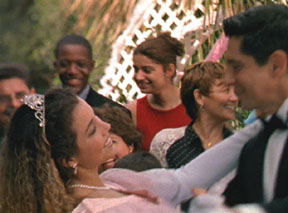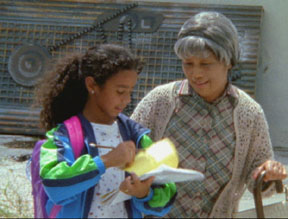
 |
 |
|
PRESENTS "TWO FAMILIES" ("DOS FAMILIAS") MEET THE QUINTERO FAMILY |
|
|
The heart of "Dos Familias" is the Quintero family, a vital, energetic, richly varied group of characters from different Spanish-speaking cultures.
Rafael Quintero, the father of the family, is a store owner, both a charmer
and leader. His wife Lupe is also very friendly and has her own business,
a beauty salon where people meet and work out their problems. They have two
daughters and a son: Angelita who is sixteen and longs to be a model,
Charito who is thirteen and more of a shy, spiritual type, and a precocious
ten-year-old son who is tempted by the gang kids who live down the street,
but kept in check by the men who play dominoes at his house. Lupe's mother
lives with them. Her best friend is El Santero, who knows more about
everyone than anyone else in the community more even than his good friend,
the parish priest Padre Jose who, along with handsome Sergent Caldado, joins
the domino game two evenings a week. |
HISPANORAMA TV HOME LATINO AUDIENCES DRAMA THAT TEACHES AND INSPIRES MEET THE QUINTERO FAMILY SAMPLE CLIPS PRODUCTION TEAM COMMENTS 
|
|
Viewers will come to understand that the other family of "Dos Familias" is
the extended family of aunts and uncles living elsewhere in the U.S., along
with the grandparents, cousins, grand aunts and uncles back in their home
country. But metaphorically, the family also extends to friends and
neighbors in the community, including an African-American business partner,
and an anglo couple -- he a bottler serving the Quintero bodega (all-in-one
grocery / drug / hardware store) and his wife the schoolteacher who has had
all of the Quintero children in school. |
|
|
STORIES WITH A DIFFERENCE There are many drama series on Spanish television that follow the fortunes of families. What is innovative about "Dos Familias" is that out of the struggles and conflicts inside the Quintero family and between the family and the larger society will grow a celebration of the power and resiliency of family values like love and hope, charity and forgiveness. |
|
|
Life is never dull or easy for the Quintero family who on the whole are good
people, but are by no means perfect people. As they face the many
challenges of parenting, running a business, learning the laws and customs
of a new culture, they are hampered by their own weaknesses and ignorance,
but also are surprisingly resilient, and are fundamentally good at heart. Because members of the family come from so many different countries, they are forced to learn to work out their differences and accept each other. They learn tolerance for differences between African-Americans, Puerto Ricans, Cubans, Dominicans, and Mexicans, and all discover that they can learn from each other. |

|
|
Community leaders give encouragement to members of the family who face
discrimination when they go out looking for jobs. They learn about their
ability to assert their rights, something they would never have been able to
do in their native country. We will see the power of love as parents give support to the Quintero children who suffer the pain of prejudice in their school, where speaking Spanish is a sign of ignorance, where Hispanic faces are not considered beautiful like "American" faces, and where "foreigners" are considered uncool. |
|
|
When there is not enough money to go around, the choices are hard. Should
they buy a better truck so that it doesn't break down all the time, or bring
the other Grandma to the States from Puerto Rico? Save for college, or make
improvements to the family store? Things are made worse when one of the
uncles steals money from the store, goes back to the Dominican Republic, and
has it stolen. When he returns, family must struggle to forgive him and give
him another chance. It takes courage and cunning to combat the disturbingly powerful El Gato and Pistola, who smuggle people across the border, cynically encourage young people to join gangs or steal for them, work with the Anglo underworld to extort protection money from family businesses, and offer loans with huge interest rates to people desperate for money. Many of the valuable lessons embedded in the stories arise from recognizing the destructiveness of such people, and the struggle of the community to defeat them. |
 
|
|
We will see the power of hope to overcome despair, as when the family
gathers together to help when the grandmother becomes ill, or when it is
learned that a teen nephew has AIDS. "Dos Familias" will be unique among Spanish-language programs in its blend of entertaining writing, powerful acting, and strong production values. It will offer a chance for audiences to see a real family a family like theirs which shares humor, compassion, and loyalty in good times and bad the kind of family lacking among the many programs currently available on Spanish language television. The power of PSAs is to call attention to one issue in 30 or 60 seconds, and hammer it into the consciousness through repeated viewings. The programs. The power of hour-long dramas is that they are whole stories with a weave of many different themes. The pilot and subsequent episodes would not only receive repeated airings on broacast, cable, and satellite TV, but could also be made available to all dioceses with Latino members young and old -- to generate group discussion of the issues treated, and enhance involvement of families with the church. Return Home |
|